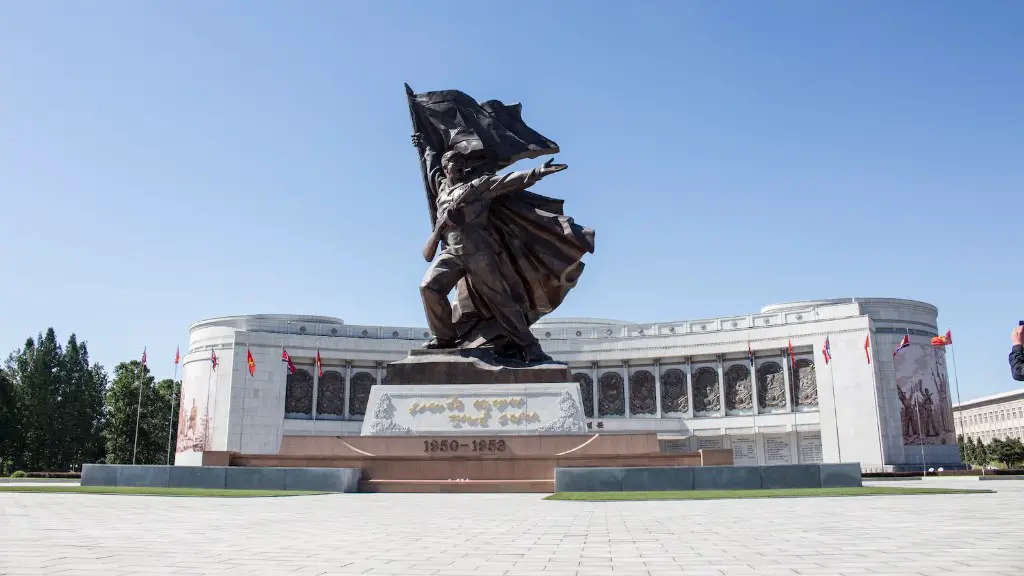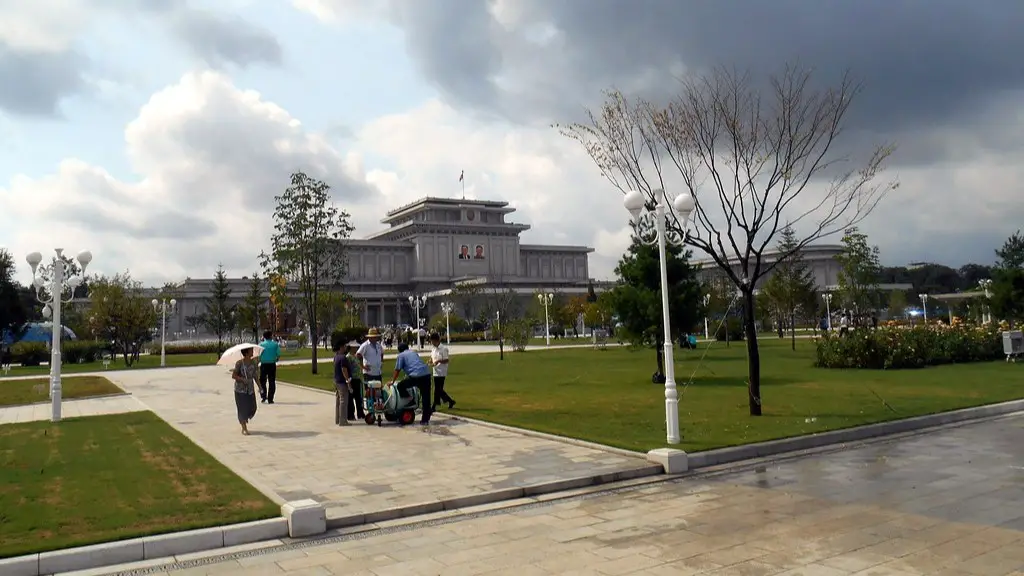Overview
North Korea is a powerful nation with its nuclear program making it a worth adversary in the international arena. For decades, the country has worked hard and has achieved advanced nuclear capabilities. The North Korean nuclear program began in the mid-1970s under the rule of Kim Il-Sung, the founder of the modern-day North Korea, and it has become a major focus of its government ever since. North Korea has consistently sought to reaffirm and expand its nuclear arsenal, and has conducted numerous exercises and weapons tests to demonstrate its capabilities. This article will explore the history of the North Korean nuclear program and the major developments it has seen throughout its history.
Early History and Development
North Korea began importing nuclear materials and technology in the mid-1970s. It signed the Nuclear Non-Proliferation Treaty in 1985 and undertook to set up a nuclear research laboratory in the country’s capital, Pyongyang. North Korea joined the International Atomic Energy Agency (IAEA) in 1986, prompting Western governments to make attempts to halt its nuclear weapons program. Following the collapse of the Soviet Union in the early 1990s, Pyongyang began to move towards developing a more powerful nuclear arsenal.
In 1993, North Korea announced that it would withdraw from the Nuclear Non-Proliferation Treaty, prompting concern among international powers. This decision was reversed in 1994 when the United States and North Korea signed the Agreed Framework which stipulated that the country would freeze its nuclear program and enter into negotiations regarding denuclearization. This agreement ultimately failed, and in 2001 Pyongyang announced that that it was resuming work on its nuclear weapons program.
Development of Nuclear Capabilities
North Korea is believed to have begun producing plutonium for its nuclear program in 2002. In 2006, the country conducted its first nuclear weapons test, which was condemned by the international community. After the test was conducted, Pyongyang declared that it considered itself to have nuclear capability. Reports from the United States intelligence services suggest that the North Korean leadership had been working towards achieving an atomic device for many years prior to this announcement.
North Korea continued to develop its weapons program in the following years, launching various missiles and conducting further nuclear tests. Analysts suggest that the country has sufficient material to build between 10 and 20 nuclear warheads. In addition, North Korean leadership has claimed to have developed a Hydrogen bomb, which would greatly increases their weapons capability.
Sanctions and Rejection of International Deals
International powers have responded to North Korea’s nuclear development by implementing a number of economic sanctions. These sanctions have included bans on weapons sales and energy trade, as well as limits on financial transactions by North Korean entities. The United Nations imposed its strongest sanctions in 2017, imposing a global ban on North Korea’s exports; however, despite this, North Korea has continued to make progress towards their nuclear ambitions.
The country has consistently rejected deals offered by international powers that would involve the reduction or dismantling of its nuclear program. In 2018, North Korean leader Kim Jong-Un stated emphatically that despite a meeting with the South Korean leader, he “will never give up our nuclear weapons.” Recent reports from the United States intelligence services suggest that North Korea has maintained its nuclear activities in the face of recent diplomatic deals and is currently continuing to develop its capabilities.
Reasons for Continuing Nuclear Program
Most analysts agree that North Korea is unlikely to give up its nuclear program, given the gains it has made so far and the increasing tensions between the country and its international opponents. One of top reasons for North Korea’s commitment to the program is to ensure the survival of the Kim regime by deterring any attacks, either internal or external, against the state. The possession of nuclear capability provides the North Korean leadership with a powerful sense of security and a form of leverage when engaging with its opponents on the global stage.
In addition, many analysts believe that the North Korean leadership views its nuclear arsenal as a form of status in the region, as the only country in the East Asian neighborhood to be in possession of nuclear capability. This gives the North Korean leadership a tremendously powerful bargaining chip when engaging on diplomatic issues, as well as in the international community.
International Relations
North Korea has consistently sought to improve its relations with other countries, particularly with its neighbor in the South. Since the beginning of the nuclear program, Pyongyang has aimed to use the nuclear capability and its ambiguous status as a nuclear state as a tool for political and diplomatic maneuvering. It has frequently sought to establish a sense of mutual threat and deter opponents from taking action against it.
At the same time, the North Korean leadership has used the possibility of denuclearization as a bargaining chip when discussing issues with international powers. The Chinese government, in particular, has acted as a mediator between Pyongyang and the international community. China, however, is not the only country North Korea has pursued diplomatic relations with in recent years. For example, North Korea and the United States have held a series of high-level talks, during which discussion of the country’s nuclear program has taken place.
Political Impact of North Korean Nuclear Program
The North Korean nuclear program has had a profound effect on the global political landscape, with many experts suggesting that the presence of a nuclear-armed North Korea has driven geopolitical tensions on the Korean Peninsula and beyond. The threat of nuclear escalation has brought many issues to the fore: including the strong economic ties between North Korea and its Chinese neighbor, the security dilemma on the Korean Peninsula created by ongoing military exercises, and the ongoing diplomatic tensions between the United States and North Korea.
Although the exact effects of the nuclear program are difficult to quantify, it is clear that it has had a profound impact on international diplomacy, with many countries taking a hard line on North Korea in an attempt to prevent the further advancement of its nuclear capabilities. In addition, it has had a major effect on the security and stability of the region, with North Korea’s neighbors wary of the potential for an all-out conflict on the Korean Peninsula.
Efforts to End North Korea’s Nuclear Program
In spite of the aggressive moves from Pyongyang, some countries have advocated for diplomacy instead of military action. In 2018, the leaders of North Korea and South Korea held the first meeting in more than a decade in an effort to reduce tensions on the Korean Peninsula. This meeting was followed by several other summits involving the two countries’ leaders and the United States President.
Though the discussions have yet to lead to any meaningful denuclearization, they have created space for further negotiations with Pyongyang. The United States and South Korea have taken a joint effort to drive these discussions forward, while China and other regional powers have proposed various initiatives to bring the two sides to the negotiating table.
Risks of the North Korean Nuclear Program
Despite the ongoing negotiations, some analysts remain concerned about the risk of war stemming from North Korea’s nuclear program. The possibility of a conflict between North Korea and the United States has been a recurring topic of discussion for years and recent escalations in the rhetoric of both sides has only served to heighten these concerns.
In addition, the risk of North Korea transferring its nuclear knowledge or technology to other countries, or even terrorist groups, is a major worry for many international powers. Pyongyang’s considerable nuclear capabilities, combined with its long-standing desire to assert itself on the international stage, create a potent recipe for potential disaster.
North Korean Nuclear Program In Summary
North Korea’s nuclear program has been a major issue for decades. It is not only a threat to international security, but could also lead to dire consequences should it become more advanced and aggressive. The North Korean leadership has maintained its nuclear ambitions despite international condemnation and diplomatic deals, and the program is likely to remain a major focus both domestically and internationally.
Despite this grim picture, some international powers have sought to address the issue through negotiation and diplomacy. The United States and South Korea have sought to drive the negotiations forward, while China and other regional powers have proposed various initiatives to bring the two sides to the negotiating table. In the end, it remains to be seen if any of these efforts will bear fruit and bring about an end to North Korea’s nuclear program.


